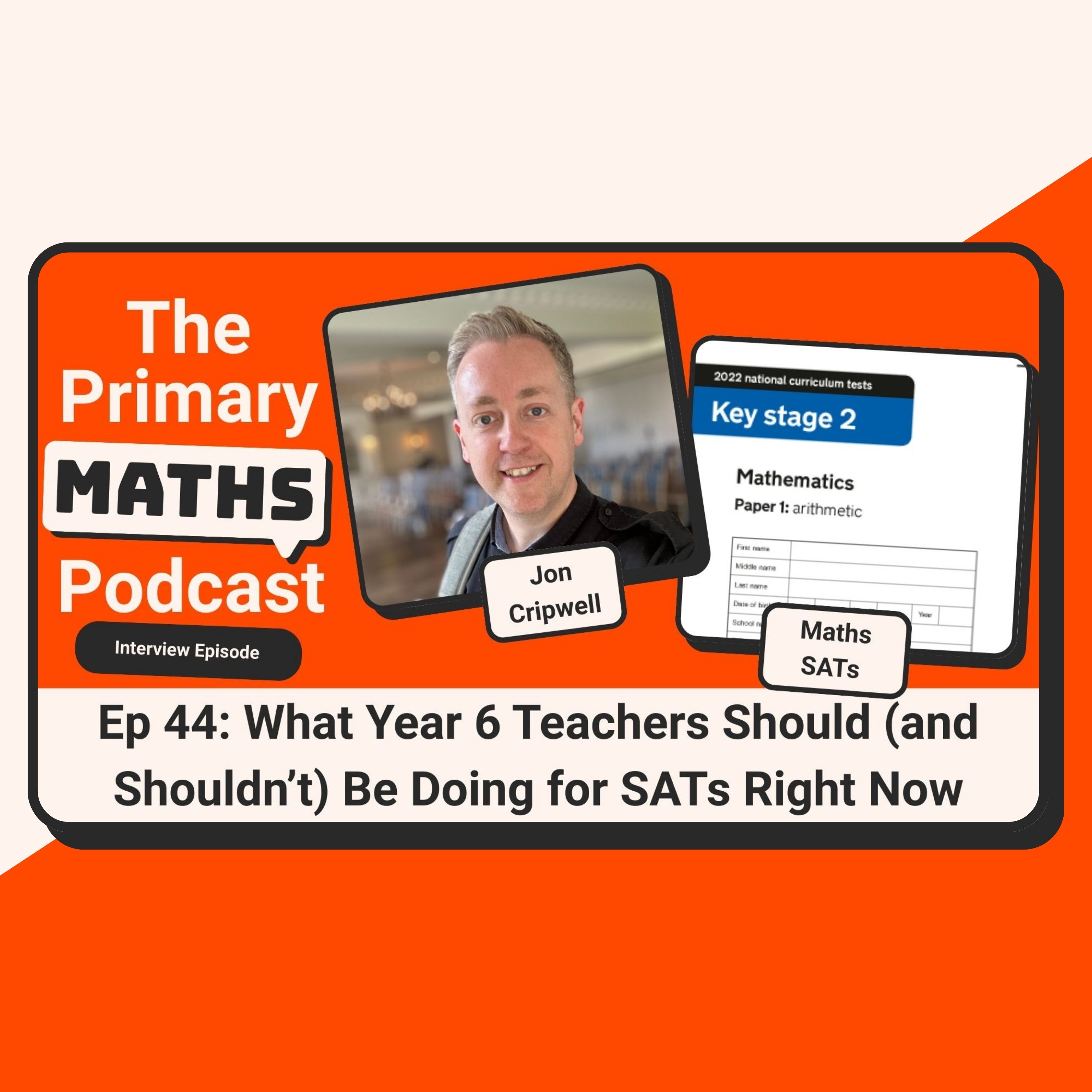The Primary Maths Podcast

The Primary Maths Podcast
Podcast Description
The Primary Maths Podcast is where classroom conversations meet big ideas.
Each week during term time, join me, Jon Cripwell, and co-host Becky Brown as we chat with inspiring guests from across the world of education - teachers, leaders, researchers and more - about what really works in primary maths.
Whether we’re tackling maths anxiety, diving into lesson design, or exploring the joys and challenges of leading maths across a trust, we keep things practical, thought-provoking, and rooted in the reality of school life.
Expect:
- Weekly interviews with expert voices shaping maths education
- “The Maths of Life” – those everyday moments where maths sneaks in (like holiday currency conversion or splitting the bill!)
- Our top takeaways for teachers and maths leads
- One resource spotlight per episode (because free CPD should come with useful stuff)
- New episodes every Tuesday during term time. Occasional summer specials may sneak in when we just can’t help ourselves.
Podcast Insights
Content Themes
The podcast explores essential themes in primary maths education, including maths anxiety, lesson design, and leadership within maths. Episodes feature practical insights such as addressing maths anxiety with experts like Dr. Heidi Kirkland, and segments like 'The Maths of Life' which discuss real-world applications of maths, as well as a resource spotlight showcasing tools for teachers.

The Primary Maths Podcast is a year-round maths podcast for teachers, leaders and anyone interested in how children learn mathematics.
Every Tuesday, join me, Jon Cripwell, for an in-depth interview with an expert voice from across education – teachers, leaders, researchers, authors and thinkers – as we explore what really works in primary maths. We dive into the big ideas shaping maths education, from maths anxiety and fluency to task design, curriculum, reasoning and problem solving.
Then on Fridays, Becky Brown and I return for Aftermaths — a shorter, light-hearted, practical debrief where we unpack the week’s key insights, and share clear takeaways for the classroom.. We also share listener stories and discuss The Maths of Life, amongst other topics.
Across the week, expect:
– Insightful conversations with the people shaping maths education
– Clear, actionable takeaways for teachers and maths leads
– The Maths of Life — the surprising ways maths shows up in everyday moments
– A weekly resource spotlight
– New episodes every Tuesday and Friday, all year round
If you’re looking for a thoughtful, practical teacher podcast that blends research, real classrooms and conversations that matter, this is the place to start.
SATs season can feel overwhelming — especially in Year 6. In this special interview-style episode, Jon is joined by Becky Brown to talk honestly and practically about how to prepare pupils for KS2 Maths SATs without turning the rest of the school year into one long revision session.
Recorded in January, this episode focuses on what really matters from now until May, and why SATs should be seen as a culmination of a key stage, not a last-minute scramble owned by Year 6 teachers alone.
In this episode, we explore:
- Why SATs are a Key Stage 2 assessment, not a Year 6 curriculum
- What to prioritise from January onwards (and what not to panic about)
- How to use arithmetic practice strategically without narrowing teaching
- When and how to use past papers effectively — and when to avoid them
- The importance of question-level analysis, not endless test practice
- Teaching test technique without undermining good maths habits
- How to support pupils currently working below expected standard
- Making intervention purposeful, human, and confidence-building
- Why “greater depth” in SATs isn’t about different content
- Supporting pupils’ wellbeing and confidence alongside preparation
- Common mistakes schools make — and what to do instead
Jon also shares reflections from over a decade of teaching Year 6, including what he would (and wouldn’t) do differently, while Becky brings the perspective of intervention, marking insight, and secondary readiness.
Recommended resources mentioned:
- Twinkl’s SATs Survival Hub
- Half-length and topic-specific maths practice papers
- Concept videos and structured intervention programmes
- Test technique guidance and revision planning tools
Get involved
Have you found something that works particularly well in your school during the run-up to SATs?
Jon and Becky would love to share community wisdom in a future Aftermaths episode.
📩 Email: [email protected]
💬 Or leave a comment on YouTube — tips welcome!

Disclaimer
This podcast’s information is provided for general reference and was obtained from publicly accessible sources. The Podcast Collaborative neither produces nor verifies the content, accuracy, or suitability of this podcast. Views and opinions belong solely to the podcast creators and guests.
For a complete disclaimer, please see our Full Disclaimer on the archive page. The Podcast Collaborative bears no responsibility for the podcast’s themes, language, or overall content. Listener discretion is advised. Read our Terms of Use and Privacy Policy for more details.